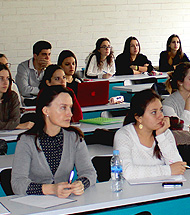Body obsession taken to the extreme
Eating disorders and their coverage in the media, at the XI seminar of Communication and Health.


The obsession of some people with their health and the cult of the body has been the subject of study for several decades. Eating disorders have set off alarm bells among health experts, who are trying to offer a different vision to the one currently promoted in society. The challenge that these experts are facing is to establish a correct roadmap indicating how a person has to deal with his or her weight and eating habits.
This has been one of the topics of the XI Edition of seminar of Communication and Health that begins another chapter in this 2014, under the degree scroll "Towards the convergence of a strange couple". The professor of the Degree in Nutrition of the University of Navarra, Susana Santiago, explained last Thursday, January 16, the eating behavior disorders. The previous day, those in charge of uncorking the seminar had been Alejandro Navas and José Javier Sánchez Aranda, both professors of the School of Communication of the University.
Although anorexia nervosa and bulimia nervosa are the best described disorders, it is increasingly common to see news about "other disorders" such as vigorexia, orthorexia or pregorexia, although they have not yet been recognized as clinical entities.
This "obsession with thinness and having a muscular body" can reach unsuspected limits, and according to Professor Santiago, can lead to serious alterations, such as a distortion of the body's self-image, as well as the inability to recognize excessive weight loss and the risks it entails for health. A whole host of "psychological alterations" that can greatly affect the person and his or her environment.
Young people have common factors in these eating disordersAs a curious case, there are many factors that can influence the appearance of this subject of disorders, both personal (lack of self-esteem, fear of maturing, precocious puberty or a history of overweight) and family (overprotection, conflicts and lack of communication). Pre-adolescence and adolescence are more vulnerable stages, especially in areas related to the world of fashion or certain sports activities that require strict control of weight or image.
The media in the world of health careThe role of the media in the health field could not be left out of the discussion at area . Professor Santiago was critical of the treatment given to news in this area. "In certain aspects, the media have done a disservice as a vehicle for inaccurate messages regarding the concepts of healthy weight or about the treatment of obesity by professionals and under supervision. A message is being sent that is not the real one," commented Susana Santiago, alluding to the media's distortion of sensitive issues. "Obesity cannot be the subject of spectacle," Professor Santiago pointed out, while commenting on examples of television programs that treat this subject subject with little delicacy.
Nor is the press left out, which according to Susana Santiago sometimes "tends to err on the side of sensationalism, superficiality and a certain lack of rigor when it comes to disseminating news related to eating disorders". On the other hand, she commented that this subject news does not usually appear in the health sections, but in the society or events sections, and hardly offers information on "global statistics and data or how to prevent or treat them".
However, it should not be forgotten that the media are also "a tool core topic for the prevention of eating disorders", from the point of view of regulating protected schedules for young people of certain advertising messages, as well as promoting positive messages regarding healthy eating habits and lifestyles.
In addition, the professor points out that although great efforts are being made in subject of Education for health in this topic, there is still work to be done. This work lies in relation to the regulation of social networks or web pages that advocate these disorders, advertising on food, dietary products and miracle diets, the promotion of healthy lifestyles in the school and family environment, as well as the regulation of clothing size, so that it adjusts to the real status of the youth population.
